Men’s Downhill
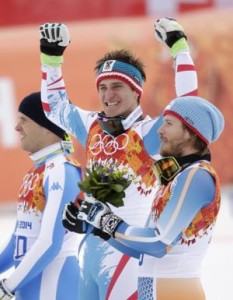 This is easily the premier event at the Winter Olympics, much as the Men’s 100m is at the Summer Olympics. A better analogy, though, might be to assert that the Downhill is to ski racing what Formula One is to car racing. This clearly makes the former inherently more dangerous, but it also looks more thrilling to perform; it is certainly more thrilling to watch.
This is easily the premier event at the Winter Olympics, much as the Men’s 100m is at the Summer Olympics. A better analogy, though, might be to assert that the Downhill is to ski racing what Formula One is to car racing. This clearly makes the former inherently more dangerous, but it also looks more thrilling to perform; it is certainly more thrilling to watch.
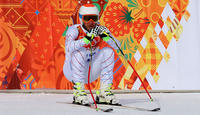 Bode Miller is the most decorated Alpine skier in U.S. history. And, with the exception of Lindsey Vonn, nobody had more media attention and greater expectations coming into these Games. Miller only increased both by winning two of the three training runs before today’s actual event.
Bode Miller is the most decorated Alpine skier in U.S. history. And, with the exception of Lindsey Vonn, nobody had more media attention and greater expectations coming into these Games. Miller only increased both by winning two of the three training runs before today’s actual event.
Mind you, such was the hype surrounding his winning form, that I wondered aloud if he wasn’t being goaded into leaving his best runs on the mountain during those training runs; or if his competitors were just playing possum.
Whatever the case, my favorite to win this event was Aksel Lund Svindal of Norway. Which is saying a lot considering that he was dating my Olympian crush, Julia Mancuso, for years until they broke up last September.
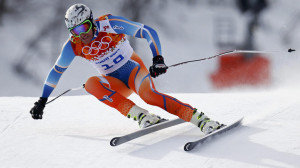 But seriously, the only reason Svindal was my favorite is that he made a lasting impression when I saw a documentary years ago on the dedication and effort he put into his rehabilitation. He suffered what should have been a career-ending injury during a Downhill training run in Colorado in 2007. Lindsey Vonn, who had to withdraw from these Games to continue rehabbing a less serious injury, can attest to the superhuman feat it took for him to return to form, which Svindal did by winning silver in this event at the 2010 Vancouver Olympics. What’s more, he seemed poised to do at least as well today, given training runs that had him finishing close behind pace-setting Miller.
But seriously, the only reason Svindal was my favorite is that he made a lasting impression when I saw a documentary years ago on the dedication and effort he put into his rehabilitation. He suffered what should have been a career-ending injury during a Downhill training run in Colorado in 2007. Lindsey Vonn, who had to withdraw from these Games to continue rehabbing a less serious injury, can attest to the superhuman feat it took for him to return to form, which Svindal did by winning silver in this event at the 2010 Vancouver Olympics. What’s more, he seemed poised to do at least as well today, given training runs that had him finishing close behind pace-setting Miller.
Alas, it was not to be: neither for Miller nor for Svindal. Because Matthias Mayer of Austria came out of nowhere to win gold; Christof Innerhofer of Italy, silver; and Kjetil Jansrud of Norway, bronze. (Miller finished eighth; Svindal fourth, just off the podium.)
Women’s Slopestyle
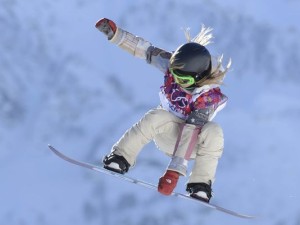 As best as I can tell, American men and women sweeping gold medals in this debut event is about as surprising as them sweeping gold in Basketball at the Summer Games.
As best as I can tell, American men and women sweeping gold medals in this debut event is about as surprising as them sweeping gold in Basketball at the Summer Games.
To be fair to the men, though, watching women ski Slopestyle is rather like watching women play Basketball. Have you ever seen any woman “play like Mike”?
 That said, Jamie Anderson of the United States won gold; Enni Rukajarvi of Finland, silver; and Jenny Jones of Great Britain, bronze.
That said, Jamie Anderson of the United States won gold; Enni Rukajarvi of Finland, silver; and Jenny Jones of Great Britain, bronze.
But I cannot resist observing that Anderson should allay all sponsors’ concerns that this Winter Olympics without Vonn would be like a high school prom without the queen. Because not only is Anderson more beautiful and charismatic, she’s also now the golden girl of the coolest sport in Olympic history.
Women’s 3000 Speedskating
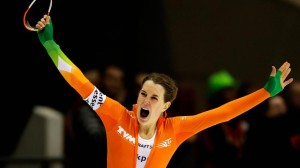 Well, I suppose it’s fair to assert now that the Dutch are as dominant in Olympic Speedskating as the Jamaicans are in Olympic Sprinting. Because Ireen Wuest followed up her male compatriots’ sweep in the 5000 yesterday by winning gold in Women’s 3000 today. Martina Sablikova of the Czech Republic won silver; and Olga Graf of Russia, bronze.
Well, I suppose it’s fair to assert now that the Dutch are as dominant in Olympic Speedskating as the Jamaicans are in Olympic Sprinting. Because Ireen Wuest followed up her male compatriots’ sweep in the 5000 yesterday by winning gold in Women’s 3000 today. Martina Sablikova of the Czech Republic won silver; and Olga Graf of Russia, bronze.
But, given all of the condemnation Russia’s anti-gay laws incited worldwide, Wuest will have to forgive the Western media stoking the fact that she’s the first openly gay athlete to win gold in Sochi.
Men’s Skiathlon
A relatively new Olympic event (it began in its current format in 2006), the Skiathlon requires that skiers race the first half of the course on classic technique skis, then swap them for skating skis at the halfway point, and finish the race using the free technique.
In the women’s race, the skiers cover 7.5 kilometers in each half of the race. On Sunday, the men will ski twice as far in their event.
(New York Times, February 8, 2014)
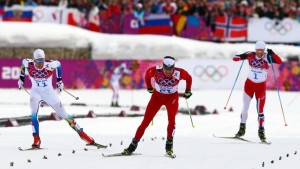 I wrote above that the Downhill is like Formula One car racing on skis. Well, Skiathlon is even more analogous to car racing in that it combines cross-country skiing at “full throttle” with pit stops.
I wrote above that the Downhill is like Formula One car racing on skis. Well, Skiathlon is even more analogous to car racing in that it combines cross-country skiing at “full throttle” with pit stops.
Trust me folks, if you haven’t watched any of the cross-country events, you’re missing out on what Olympic racing is all about. For example, Skiathlon has unyielding skill struggling to keep unbridled guts in check over a grueling course that ends with competitors displaying the very best of the thrill of victory and the very worst of the agony of defeat. The obvious athleticism and stamina (including mental) required to compete in cross-country/biathlon/skiathlon skiing at this level make even Iron-Man competitors look like mere weekend warriors by comparison.
But, if nothing else, you’ll find the excited utterances of NBC’s color commentator for the cross-country events, Chad Salmela, entertaining enough. Trust me, he’s even more entertaining than John Madden providing color commentary for Football games, or John McEnroe doing so for Tennis matches.
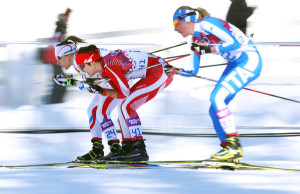 Anyway, apropos of impressive and inspiring rehab stories, “super” Dario Cologna of Switzerland recovered from an ankle injury he suffered just two months ago to win gold. Marcus Hellner of Sweden won silver; Martin Johnsrud Sundby of Norway, bronze.
Anyway, apropos of impressive and inspiring rehab stories, “super” Dario Cologna of Switzerland recovered from an ankle injury he suffered just two months ago to win gold. Marcus Hellner of Sweden won silver; Martin Johnsrud Sundby of Norway, bronze.
Incidentally, even though I watched it, I neglected to comment on the Women’s Skiathlon yesterday. But Marit Bjorgen of Norway who won gold, Charlotte Kalla of Sweden, silver, and Heidi Weng also of Norway, bronze, all deserve honorable mention.
NOTE: Russia got on the medals board in big fashion today, winning four medals, including gold in Team Figure Skating competition.
MEDAL COUNT
Norway: 7; Netherlands: 4; United States: 4